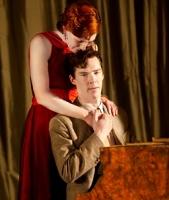After the Dance
In a sense, 'After The Dance' is something of a lost work. First produced in 1939, the play's initial success was halted by the onset of the Second World War. The writer, the much acclaimed Terence Rattigan, seems to have deliberately excluded it from an anthology of his writing, and there have been less than a handful of productions of the play since the 1950s.
'After The Dance' was Rattigan's second play to be produced in the West End. His first hit, 'French Without Tears', opened in 1936 and provided Rattigan with instant recognition and the means to fund a lavish and rather excessive lifestyle which accounts to some extent for the three year gap between his first success and 'After The Dance'.
It's August 1938 when the play starts. The action takes place in the Mayfair flat of one David Scott-Fowler and his wife, Joan. David and Joan are part of the 'bright young things' set, even though they are no longer quite that young. Rich and supposedly cultured, they've been partying along with their chums for the best part of twenty years and nothing seems likely to stop them. From the onset, the booze flows as if there's no tomorrow. Gin, brandy and whisky are guzzled in copious quantities as soon as the characters wake in the morning (or afternoon), and frequent parties permeate what are actually rather repetitive and boring lives.
David's cousin, Peter, acts as David's secretary typing a book that sounds like it's been written through an alcoholic haze. And indeed it has. Peter is in love with Helen and they plan to get married as soon as they can. But when Helen turns up at the flat one day with her doctor brother in tow, she appears to have more than a passing interest in David's health, and before long it is common knowledge that Helen and David are in love.
The acting is universally flawless and convincing. Benedict Cumberbatch excels in the lead as David, defining a man who is difficult to dislike and who cares for those around him rather more than he first wishes to admit. Adrian Scarborough is also in fine form as David's friend John who is a self-confessed leach, but nevertheless has inner morality and insightful knowledge of human nature. Nancy Carroll is David's elegantly demure wife, Joan. Although she convinces us in the early stages of the play that nothing much bothers her or interferes with her socialising and drinking, when she realises that she's lost David, her breakdown is all the more powerfully poignant and incredibly moving. John Heffernan as Peter and Faye Castelow as the earnest and spirited Helen, are also equally impressive.
Hildegard Bechtler's set embodies elegant simplicity without being opulent. And director Thea Sharrock's decision to anchor the story in its original era - rather than modernise it in some way - is essential in understanding the protagonists because their motives are largely defined by the time in which they lived. As you might expect given the social class of the characters, the dialogue is peppered with 'awfully, frightfully' and other like phrases, and more than a good smattering of 'darling'. Though it grates a little to me, the dialogue is authentic and captures both the mood of the times as well as the class under scrutiny.
In some sense, 'After The dance' is semi-autobiographical. Rattigan certainly indulged himself in the good life once his income soared after the success of his first play. He even moved into a Mayfair flat, and Rattigan's lover died in a swimming accident that some consider to have been a disguised suicide. And he didn't write very much for more than a year - presumably because socialising took priority.
At just under three hours (with two intervals) 'After The Dance' might seem something of a marathon, but it never flags. Driven by intelligent wit, well-defined and interesting characters and a compelling story, it easily maintains interest and keeps the audience guessing about the outcome. Not quite a great play but certainly one that deserves to be aired rather more than it has been in the past. And this faithful and powerful production more than does it justice because Thea Sharrock and her team have really got under the skin of the characters to help us understand a segment of a generation that in themselves were, for a time at least, lost.
"Every few years the British theatre rediscovers Rattigan with an air of astonished surprise: this excellent production reminds us that we should simply accept him as one of the supreme dramatists of the 20th century."
Michael Billington for The Guardian
"This is the National Theatre at its best: an obscure yet excellent English play, directed with tact and vision, and stunningly performed."
Henry Hitchings for The Evening Standard
"Superb production...One leaves the theatre convinced that a neglected classic has finally been honoured."
Charles Spencer for Daily Telegraph
"Superbly articulated production."
John Thaxter for The Stage
"If Thea Sharrock's handsome, shrewdly conceived and expertly acted revival does not establish the piece as a lost masterwork, it reveals a powerfully affecting, flawed, and fascinatingly imbalanced early study of an enduring Rattigan theme: the emotional repression in the English psyche that often turns heterosexuality into a love that dare not speak its name."
Paul Taylor for The Independent
External links to full reviews from popular press
Guardian - Telegraph - Independent
Originally published on
